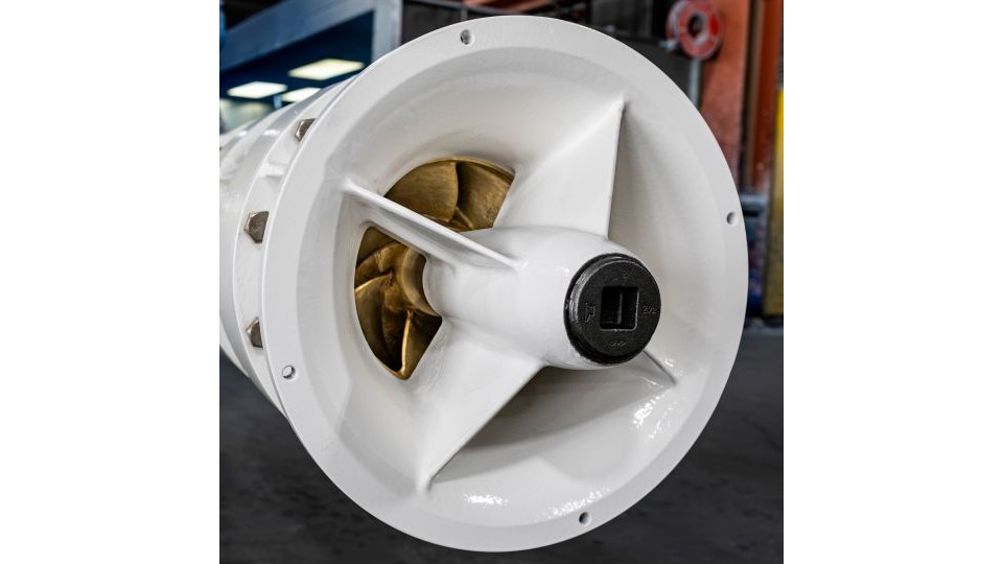Experts stress the urgent need to value water more highly. Industrialization, a growing population, and climate change have increased demand for this limited resource over the past centuries. Currently, over 2 billion people face water scarcity, and by 2050, global water demand is expected to increase by 25%. This rising demand, along with droughts, industrial waste, and inadequate infrastructure, is likely to drive up water prices and impact every industrial sector. Trillium Flow Technologies, with its innovative capabilities and extensive experience, is well-equipped to help industrial plant operators improve the efficiency, reliability, and sustainability of their water-related applications.
High-efficiency products
For over 90 years, Trillium has been manufacturing Floway vertical turbine pumps, which are renowned for their reliability, efficiency, and performance.
Engineered with precision, Floway vertical turbine pumps are designed to meet the demands of various different industries, including municipal, agricultural, and industrial water. The pumps are designed with the latest in Computational Fluid Dynamics (CFD) software to optimize features such as impeller and bowl vane angles, and hydraulic passage geometry, ensuring maximum efficiency.
Recently, the company expanded its product line to include new and improved models with higher-efficiency hydraulics. These models achieve peak bowl efficiencies exceeding 87%. In 2024, Trillium was awarded a contract for a significant water project in the Central US region, which involved the installation of eight large raw water intake pumps. With a total power requirement of 8,800 horsepower, efficiency was a critical consideration in the design of this pumping station. Floway’s newly developed, higher-efficiency hydraulic designs offered an efficiency improvement of 2 percentage points in comparison to previous designs, resulting in savings of up to 21.3 MWh per year for the customer. At the pumping station’s current electricity rate, this translates into a saving of US$106,600 per year.

High-efficiency service solutions
Trillium also makes a significant impact on plant energy saving and sustainability by strategically upgrading, re-rating, retrofitting, and replacing existing pump systems to extend their operational life and increase their efficiency. The company has been taking part in the enhancement, efficiency improvement, and automation of two water lifting plants of an Italian aqueduct, replacing the other OEMs’ pumps dating back to 1975–1980 (approximately 10 pumps) with new Trillium Termomeccanica Pompe branded high-efficiency multi-stage BB4-type pumps.
Trillium’s technical solution makes significant improvements in the pumps’ efficiency, reliability, and ease of maintenance, reducing the related operations and maintenance costs. The use of a reduced number of components, special material bearings, and new-generation composite wear rings results in lower friction, higher wear resistance, and, consequently, increased hydraulic performance, guaranteeing the pump’s operation nearest the best efficiency point. Such efficiency is demonstrated by the compliance of the pump performance tests with ISO 9906:2012/HI 14.6 - 2011 Grade 1E standards, a superior standard to Grade 1B requested by the customer.
Construction-wise, factors such as the reduced dimensions and weight of the shaft line, the lower number of rolling contact parts, the use of a cartridge mechanical seal, and the stress-reducing wear ring configuration all contribute to increasing the pumps’ efficiency and life while reducing maintenance intervals and therefore maintenance costs. Overall, the efficiency of the replacement pumps is around 8% higher compared to the old pumps.
Trillium’s solution also includes the installation of remote machine condition monitoring sensors to monitor the pumps’ health in real time and prevent disruptions and failures.
About the author
This article was provided by Trillium Flow Technologies.
This article appeared in the March/April 2025 issue of World Pumps magazine. To read the full issue click here.







